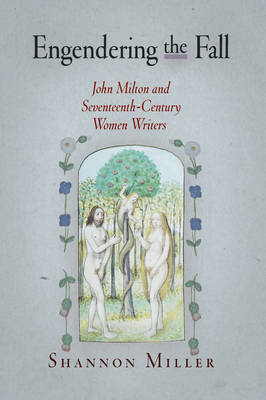
- Afhalen na 1 uur in een winkel met voorraad
- Gratis thuislevering in België vanaf € 30
- Ruim aanbod met 7 miljoen producten
- Afhalen na 1 uur in een winkel met voorraad
- Gratis thuislevering in België vanaf € 30
- Ruim aanbod met 7 miljoen producten
Zoeken
Engendering the Fall
John Milton and Seventeenth-Century Women Writers
Shannon Miller
Hardcover | Engels
€ 108,45
+ 216 punten
Omschrijving
The narrative of the Garden of Eden infused seventeenth-century political thought no less than it reflected attitudes toward the relationship between the sexes. Within the contemporary debate over political legitimacy, theorists who supported or questioned the monarchy turned explicitly to the narrative of the Garden of Eden and Adam and Eve to articulate their theories of governmental authority.
Engaging this foundational relationship between gendered interpersonal and governmental organization, Shannon Miller turns to a body of texts produced in England that replot the story of the Garden. She sets a series of writings by women into conversation with the period's most important poetic rendering of the Fall, Milton's Paradise Lost, to illustrate how significant gender was to accounts of social and political organization, and to demonstrate how the Garden narrative plots the role of gender. Her multidirectional and multilayered conversation between numerous seventeenth-century women--such as Aemilia Lanyer, Rachel Speght, Lucy Hutchinson, Margaret Cavendish, and Mary Chudleigh--and Milton's Genesis epic crystallizes the interplay between the narrative of the Fall, the organization of political structures, and the extent to which both were shaped by cultural debates over the role of women.Specificaties
Betrokkenen
- Auteur(s):
- Uitgeverij:
Inhoud
- Aantal bladzijden:
- 288
- Taal:
- Engels
Eigenschappen
- Productcode (EAN):
- 9780812240863
- Verschijningsdatum:
- 25/06/2008
- Uitvoering:
- Hardcover
- Formaat:
- Genaaid
- Afmetingen:
- 155 mm x 229 mm
- Gewicht:
- 589 g

Alleen bij Standaard Boekhandel
+ 216 punten op je klantenkaart van Standaard Boekhandel
Beoordelingen
We publiceren alleen reviews die voldoen aan de voorwaarden voor reviews. Bekijk onze voorwaarden voor reviews.











